

Education @ VicGov.au. Science Teachers Association of Victoria. Science Teachers' Association of Victoria Inc. Welcome - HTAV. GTAV - Geography Teachers' Association of Victoria - GTAV - Geography Teachers' Association of Victoria Inc. Catholic Development Network - CDN. School News, Australia - Term 3 - 2019 by Multimedia AU/NZ. The ultimate list of educational websites. National School Improvement Tool - ACER. What is it?
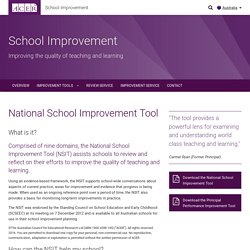
Comprised of nine domains, the National School Improvement Tool (NSIT) assists schools to review and reflect on their efforts to improve the quality of teaching and learning. Using an evidence-based framework, the NSIT supports school-wide conversations about aspects of current practice, areas for improvement and evidence that progress is being made. When used as an ongoing reference point over a period of time, the NSIT also provides a basis for monitoring long-term improvements in practice.
The NSIT was endorsed by the Standing Council on School Education and Early Childhood (SCSEEC) at its meeting on 7 December 2012 and is available to all Australian schools for use in their school improvement planning. ©The Australian Council for Educational Research Ltd (ABN 1900 4398 145) (“ACER”). How can the NSIT help my school? Research is revealing the powerful impact that school leadership teams can have in improving the quality of teaching and learning. What is the VCAL? The Victorian Certificate of Applied Learning (VCAL) is a 'hands-on' option for students in Years 11 and 12.
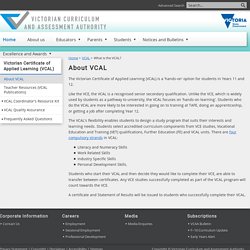
Like the VCE, the VCAL is a recognised senior secondary qualification. Unlike the VCE, which is widely used by students as a pathway to university, the VCAL focuses on 'hands-on learning'. Students who do the VCAL are more likely to be interested in going on to training at TAFE, doing an apprenticeship, or getting a job after completing Year 12. The VCAL's flexibility enables students to design a study program that suits their interests and learning needs. Using Digital Technologies to Support Learning and Teaching school policy.
Schools must be aware of and use available technology-based teaching and learning resources in a safe and responsible way, to improve student learning.
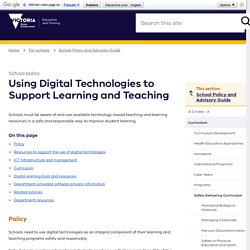
Schools need to use digital technologies as an integral component of their learning and teaching programs safely and responsibly. Note: Schools enrolling international students must ensure that no more than 25% of the student's total course is undertaken by distance or online learning. International students cannot be enrolled exclusively in distance or online learning units in any compulsory study period (defined as two terms of one semester).
See: ISP Quality Standards and School Resources under Department resources. Information Technology Division (ITD) coordinates the ICT procurement and infrastructure provision to Victorian Government schools which is central to the effective integration of digital technologies into the curriculum, see: Information Technology. Bullying. No Way! videos. A Must-Have Edtech Cheat Sheet. Flashback to the year 2008 in Pittsburgh, PA to an event known as Boot Camp—a very intense professional development training I was required to attend when I was named our district’s Classrooms for the Future Instructional Technology Coach.
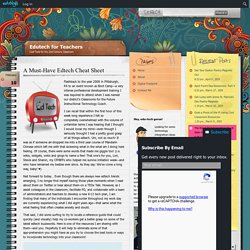
I can recall that within the first hour of this week long experience I felt so completely overwhelmed with the volume of unfamiliar terms I was hearing that I thought I would loose my mind—even though I seriously thought I had a pretty good grasp of all things edtech. Um, not so much! It was as if someone air-dropped me into a third year course of Mandarin Chinese which left me with that sickening what in the what am I doing here feeling. Of course, there were some words that made me giggle too! (i.e. wikis, widgets, vokis and glogs to name a few! Fast forward to today… Even though there are always new edtech trends emerging, I no longer find myself having those yikes moments when I read about them on Twitter or hear about them on a TEDx Talk.
New human rights guide to the Australian Curriculum. The Commission has released a new tool intended to help identify many of the opportunities that the Australian Curriculum provides for teaching students about the promotion and protection of human rights, both in Australia and around the world.
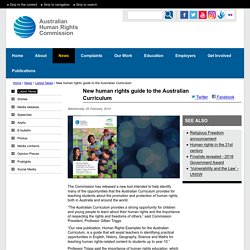
“The Australian Curriculum provides a strong opportunity for children and young people to learn about their human rights and the importance of respecting the rights and freedoms of others,” said Commission President, Professor Gillian Triggs. “Our new publication, Human Rights Examples for the Australian Curriculum, is a guide that will assist teachers in identifying practical opportunities in English, History, Geography, Science and Maths for teaching human rights-related content to students up to year 10.” Professor Triggs said the importance of human rights education, which is a right in itself, is recognised in a number of human rights treaties including the Convention on the Rights of the Child.
ICON @ CECV Implementation Site. Education Matters Magazine. Catholic Education Victoria Network. IEU VicTas. ATOM Victoria - Australian Teachers of Media. HQ the Australian education sector. My Standards App. Catholic Education Melbourne - Catholic Education Melbourne. Union Shopper - Challenge us to find you a better deal - Union Shopper. TeachMeet Melbourne (@tmmelb) TeachMeet Melbourne. Running a Teachmeet Melbourne Event Help Sheet Teachmeets are really straightforward and simple to make happen.
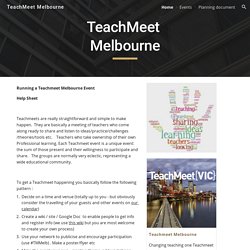
They are basically a meeting of teachers who come along ready to share and listen to ideas/practice/challenges/theories/tools etc. Teachers who take ownership of their own Professional learning. Making great teachers extraordinary. Edrolo. Your total school management solution. Media Studies – an online catalogue of Miss Borg's resources.